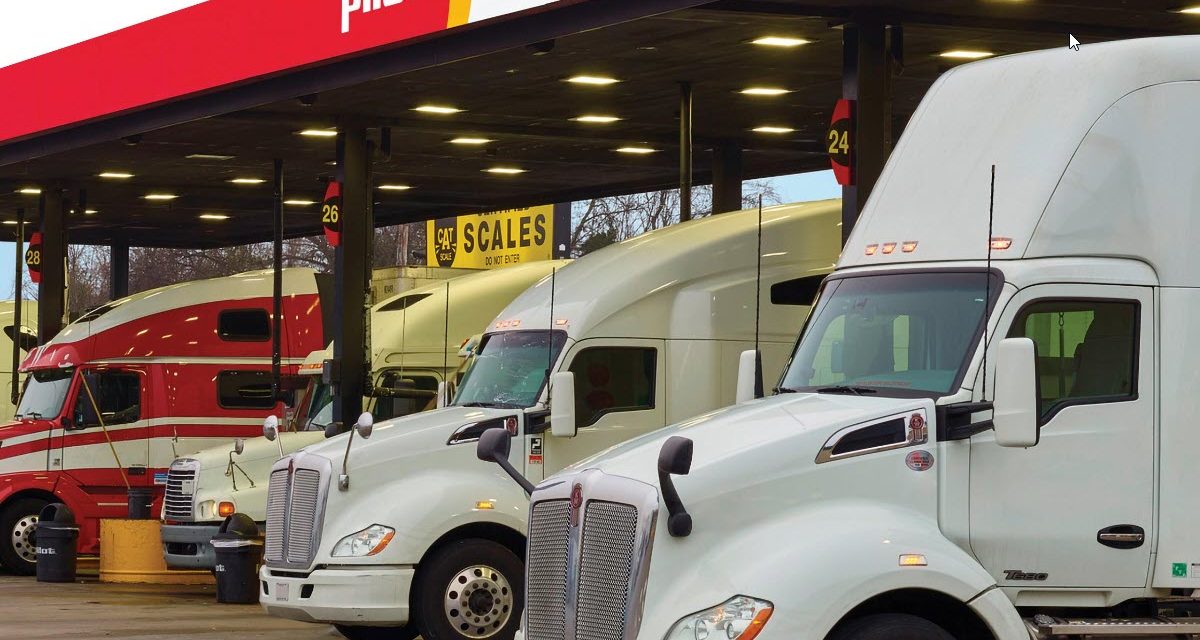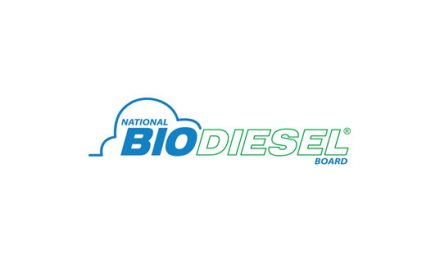How the fuel supplier and travel center operator moves billions of gallons of fuel and still maximizes the customer experience.
By Keith Reid
Pilot Company keeps North America’s drivers moving as one of the leading suppliers of fuel and the largest operator of travel centers. Founded in 1958 and headquartered in Knoxville, Tennessee, Pilot Company supplies more than 11 billion gallons of fuel per year and has an industry-leading network of more than 950 retail and fueling locations that offer a variety of products, amenities and innovative solutions to make road travel easier.
The Pilot Flying J travel center network includes locations in 44 states and six Canadian provinces with more than 680 restaurants, 74,000 truck parking spaces, 5,300 deluxe showers, 6,200 diesel lanes and 35 Truck Care service centers. The One9 Fuel Network provides fleets and professional drivers with more places to stop at a variety of fueling locations. Pilot Company’s energy division supplies fuel, DEF, bio and renewables and provides hauling and disposal services as the third-largest tanker fleet in North America. Pilot Company is ranked No. 10 on Forbes’ list of America’s Largest Private Companies.
Joe Butler is a senior director of fuel supply for the Midcontinent, Gulf Coast and East markets and manages four regional teams. Butler reports to the vice president of fuel supply, Ted Brennan. Butler and Brennan buy all of the fuel that goes into the operation’s retail stores, as well as for its wholesale marketing demand.
How challenging is it to manage the volumes that you see in your operation?
Butler: We operate nearly a thousand locations across North America and about 20 million gallons of gasoline, diesel and DEF daily to our guests and customers.
In terms of managing that challenge, over the years we’ve developed an energy team of about a hundred individuals here in Knoxville, and about a hundred traders and supply specialists in Houston. We’ve got hundreds of years collective experience weathering the different challenges that come our way. I would call us experts in fuel supply to our retail locations, and really our commitment to our customers is to provide quality fuel and amenities at a competitive price and do what it takes to continue their journeys.
Supply chains are challenged globally for just about everything, and consumers see that whenever they see empty shelves. The challenges are exacerbated due to labor shortages for retail staff and drivers. Fuel supply chains are more strained than ever, and any event like a storm or the Colonial Pipeline hack in 2021 create disruptions that are felt longer and worse than in the past.
How do you manage supply and risk management?
Market volatility demands we focus on security of supply through owning our own inventory and having great contract relationships with suppliers. Hedging our own inventory helps to create a greater sense of stability and security in the markets we operate.
What’s the relationship between the gasoline customer and the diesel customer in your operations?
We sell about 7 billion gallons a year of diesel and probably 1 billion of gasoline. Obviously, we believe that truckers make America move. Practically everything has touched a truck at some point in its life cycle. I would say that because of our truck stop operation catering to a trucking guest—the amenities of a full-scale restaurant, 24/7 amenities, 24/7 lighting—those kinds of things end up benefiting the gasoline customer that decides, ‘I’m going to be driving all night long. Am I going to be able to find places to stop? Am I going to be able to find a place that has a clean restroom? Maybe a hot sandwich or a slice of pizza?’ Those are the kinds of things that they’re going to get at a Pilot, 24/7/365.
Do you get any gasoline car customers that take advantage of the broader amenities like showers and overnight?
Absolutely. We see it more with the Penske or U-Haul customer—someone that is traveling across the country. When I first joined Flying J back in 2007 after working for Exxon and Shell in Houston, I had to move to Ogden, Utah. It was a long drive that I had to make with a U-Haul, and I decided to have my customers’ experience. I wanted to understand what a guest would experience when they stop at a Flying J. And so I stopped, got a shower and had the full experience. I’m happy to say that you feel like you would want to feel in your home shower. They clean them after every use. The towels are fresh, and there’s a fresh bar soap.
How is Pilot approaching alternative energies and any possible energy transitions down the road?
Pilot’s one of the largest over-the-road distributors of renewable fuels. In addition to ethanol and biodiesel and renewable diesel Pilot is one of the largest producer, retailer and distributor of diesel exhaust fluid. Essentially every one of our diesel dispensers has the option to fill in bulk with DEF.
When we talk about legislation, Pilot is very much pro having a plan. But what we’ve seen in some of the current legislation is more of an end game, as opposed to a true plan that would see decarbonization over several phases.
Pilot is agnostic to the fuel that our customers need. We are committed to providing best-in-class hospitality and amenities to our guests. But as far as what they need from a fuel perspective—be it electrons, hydrogen, diesel, gasoline—we’re going to be there for them.
Several of our large customers approached us in 2012 to say, ‘the spread between natural gas and diesel has blown way out. We need you to be able to give us a network of LNG across your network.’ And we said, OK, this looks like it is going to go forward. We found a partner and committed to a footprint at about 80 of our sites.
What about CNG as a fleet fuel?
We have some locations where we do CNG, and that is more of a hub-and-spoke kind of opportunity. Again, being fuel agnostic, if we had enough of an interest in our customer base to have CNG and in markets where we have that kind of customer base—California, Texas—we have some CNG options but not much.
How easy is it to find renewable supply?
We’ve had several people in our Houston trading team that are dedicated to renewables for some time now—people that have a specialty in those players and relationships. They have brought a lot more gallons into our network than we would have otherwise without having that focus. Pilot also now owns an ethanol plant in Nebraska.
Do you do your own blending and RIN management?
We have blending operations in several of our locations but not across the board. There are some places where it doesn’t make sense from an investment perspective. It is just buying a blended B2 or B5 in Minnesota, Iowa, Oregon or Pennsylvania where you have a mandate, and it’s not really an economic incentive to try and diversify.
How do you keep and attract drivers now?
It has been an incredibly challenging period over the past two years with the downturn in demand. A lot of the drivers were of an age where they could retire and leave. We haul the majority of our loads on our trucks. We work to differentiate a driving experience with Pilot from anyone else. Our drivers are home every day. We offer great, competitive incentives including 401(k) and life insurance. We have six weeks of parental leave for both fathers and mothers, which is a big deal. We have industry-leading vacation and paid time off. We have hourly pay, which a lot of drivers like. We have free coffee and fountain drinks. Extra pay for night, weekend and holiday. Those kinds of things.
I think the other thing in terms of our investments is our assets. We have a fleet where the average vehicle age is less than three years. So, they know they’re going to be driving good, clean, up-to-date safe technology.
What role does technology play in your operations?
We’ve invested heavily in our upstream and downstream technology over the past several years to make it as transparent, easy and seamless for us in the central office as well as for our drivers. We have developed our own handheld mobile technology to communicate instructions with drivers to assist in BOL reconciliation. Then we work very, very closely with our suppliers, both rack and contract, to understand the right amount of transparency. Being able to aggregate supplier portals from a decision-making perspective to know what supply is available.
Pilot is heavily investing in technology to deliver an outstanding experience to our guests. From high-speed Wi-Fi at our entire facility to use of the mobile app to map their routes, reserve a parking spot, or get pre-authorized to pump fuel to save them time, Pilot believes in creating a safe, fast, friendly and clean experience for our trucking guests. We are also launching an enhanced loyalty program for our gas and RV guests this year.
How does Pilot approach diesel quality?
We try to continuously monitor our tanks. We have systems that are constantly alerting in case there’s any kind of water ingress after a heavy rain or snow or whatever. Then we ensure that steps are taken to make sure that any problem is addressed. We have a contract with National Fuel Quality Group, a big operation, that helps us whenever we have issues. They do some routine maintenance as well as be on call if there’s a water intrusion. The other thing I would say is that we have strong connections and communication with our customers. When there is an issue, we can update our website and that will immediately flow through to them so that they know of the next three locations they can stop at. That gives them the transparency to make sure that they know when they pull off, fuel up and get what they need without any surprises.
 Keith Reid is editor-in-chief and editorial director of Fuels Market News. He can be reached at [email protected].
Keith Reid is editor-in-chief and editorial director of Fuels Market News. He can be reached at [email protected].










